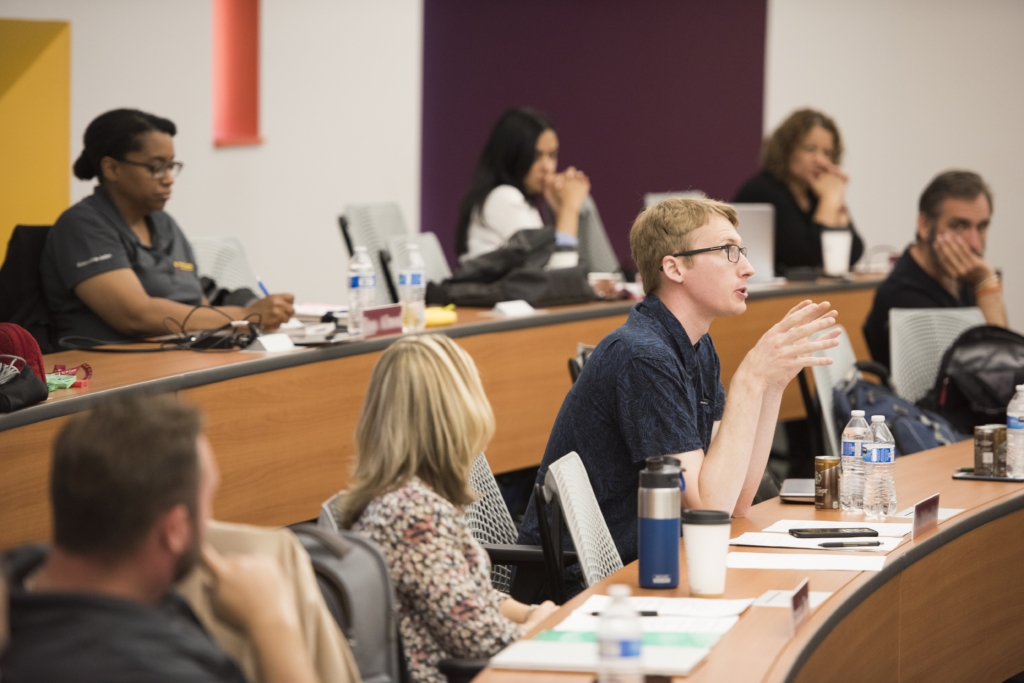
EMBA students at ASU’s W. P. Carey School of Business travel to Tempe, Ariz., once per month for immersive in-person classes. They also have live virtual meetings and asynchronous content in between the in-person sessions. Courtesy photos
Up until a couple of years ago, Shane Speirs spent almost his entire life as a student: Primary and high school in the Phoenix area where he grew up, then undergrad, medical school, residency and a fellowship in geriatric medicine.
He always knew he wanted to get a business education, perhaps to do something in healthcare delivery or in the software space. (He worked in healthcare AI and predictive analytics before attending medical school.) He didn’t consider a full-time MBA program because it just didn’t work for him as a practicing physician.
Speirs looked at top business schools like USC Marshall, a few on the East Coast, and the University of Arizona. He ultimately chose the 21-month Executive MBA at Arizona State University’s W. P. Carey School of Business, a program that meets in-person once a month on ASU’s Tempe campus.
“I wanted to go somewhere that wasn’t virtual. I wanted to go in-person and get to know people. The point of going wasn’t to get an ‘M,’ a ‘B,’ and an ‘A.’ It was to actually learn something,” says Speirs, EMBA ‘21, now president and Chief Medical Officer at HealthyU Clinics.
“I’ve never felt the support like I’ve had at ASU – not through undergrad or even med school. Even before I started, they were just set up not only to give me an education, but provide me with somewhere where I was geared up to succeed in what I wanted to do.”
ASU CAREY EMBA SPOTLIGHT
Carey’s EMBA program has a highly respected concentration in the Business of Health Care, and it has a partnership with The Mayo Clinic, consistently regarded as one of the best hospitals in the world, to educate its clinical and professional staff.
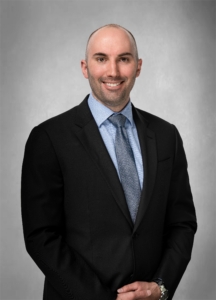
Shane Speirs, MD
Throughout his time at ASU, Speirs worked on building his own company, HealthyU – a physician-owned healthcare network focused on providing proactive care to prevent serious disease down the road. It does that, in part, through the help of a data-driven, patented software program Spiers developed during his EMBA program. He remember his statistics professor coming in on a weekend to spend hours helping Spiers brainstorm and troubleshoot the software’s algorithms. He worked on HealthyU in class projects and professors used it as test cases in lectures.
That, in fact, was one of the most surprising aspects of his EMBA experience: How applicable each class was to running a business – from reading balance sheets and income statements to becoming a competent executive. There were bits of knowledge he could take back from each lesson and apply it to his company.
Speirs started working on HealthyU full-time immediately after finishing his EMBA. The company opened its first clinic in January 2022 and has since added 18 new sites in Arizona and California.
But the most valuable part of his EMBA experience? The cohort itself.
“It would have been worth the cost alone to interact with those people for two years, even if I had not learned anything,” he says. “The people who work in finance, who work in HR that you interact with, that’s where most of your knowledge comes from: Asking questions, seeing how different units of business work and how they handle different types of problems.”
“I wouldn’t be where I’m at today or have been as successful in my business without the EMBA cohort at WP Carey. The thing that is going to continue far into the future is the network, the relationships I built with the cohort and the professors.”
Q&A WITH LUIZ MESQUITA, ASSOCIATE DEAN
ASU Carey’s Executive MBA ranked 16th in Poets&Quants’ 2022 composite EMBA ranking. Our composite ranking is based on U.S. schools’ performance in the three major EMBA rankings – U.S. News & World Report, the Financial Times, and The Economist – and schools that don’t participate in all three are penalized by our methodology.
This week, Poets&Quants For Execs is looking into the program as part of our EMBA Spotlight series. Our conversation with Luiz Mesquita, associate dean of graduate programs, is presented below and has been edited for length and clarity.
Let’s begin with a brief history of the EMBA program at Carey.
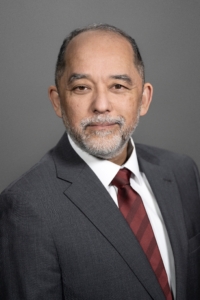
Luiz Mesquita
We launched the program officially back in 2003. We designed it for experienced professionals who want to advance their career, like mid level professionals transitioning from whatever technical background they have, or even leadership positions, to a higher ranked, bigger team, bigger units, responsibility, executive positions. We've designed it in a way that we capture people who want to continue working. We place a great emphasis on applying what they’ve learned while they're going through the program.
We've been really successful since we launched. We've been ranked No.13 by U.S. news in the United States. Our China version, which is designed for executives in China, is ranked No. 9 worldwide.
What is the value proposition for the Carey EMBA?
We offer a very rigorous curriculum taught by world renowned faculty. I believe that the source of our success is the prestige associated with a highly ranked program together with the low cost that we offer to the student.
So, world renowned faculty, an uber flexible program, but still a cohort model so students get to network, all for a very accessible value. That's the value proposition that I think got us ranked ahead of many top name brand schools actually. We're very proud of what we built.
What are the typical cohort sizes?
We typically work with between 45 and 50 students, and they are executives coming in from everywhere. We have executives coming from Mexico City, from Miami, Atlanta, New York. A lot of people from here in the valley.
About a third of our program are executives in the healthcare industry; We are really well known for executives in health care. We in fact have a partnership with Mayo Clinic which is a world leader in healthcare and innovative programs. They have 17,000 employees around the world and they have scholarships for many of their highly ranked medical staff. So we have Mayo people coming through our professional MBAs, our full time MBAs and our executive MBAs.
Was healthcare an intentional target for the program, or did it kind of evolve over time?
I would love to say it was (intentional), and that from the beginning we knew exactly where we would be. I'm a professor of business and corporate strategy, and there is what you design, what your overall plan is, and that's what we call intended strategy. There's also what we call emergent strategy: Opportunities that appear along the way, and you begin to design things here and there.
We do have a faculty who are very present in the healthcare business. I have myself been a consultant in healthcare delivery. We have partnerships with our College of Healthcare Solutions here also. And so with Mayo, it just made sense to build up; We have a concentration and classes there for people who want to specialize in health care.
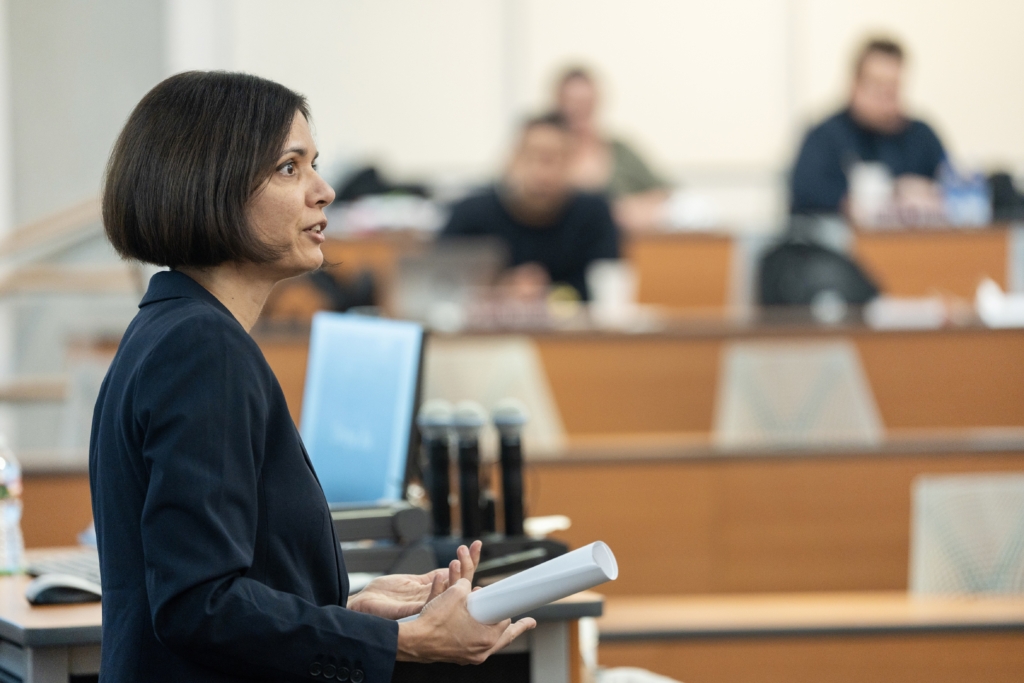
Hina Arora, Clinical Associate Professor, W. P. Carey Information Systems, engages with Carey EMBA students. Courtesy photo
What kind of demand in applications and enrollments are you seeing over time? Any plans for growth?
We're seeing growth, but let me qualify that. The MBA market as a whole is flat as we all know. Some people say it's falling, but it’s not.
What has happened is that, over time, this graduate program known as the MBA – which used to attract a lot of people because it was the only choice out there – saw the market evolve around it. What about people without experience that would like to get a master's degree? What about people that wanted to specialize in marketing, supply chain, or finance? These smaller programs, offered earlier in the career stage than traditional MBAs, are eating away at the market.
But, the market as a whole continues to grow. It is really critical for you to obtain advanced degrees in business.
So, at ASU Carey, our numbers are growing because our program is well designed. Healthcare is an industry that has really strong growth. We have been extremely innovative with scholarshipping the very type of people that we want to attract. Our partnership with Mayo was not merely, “you're here, we are here, let's grow together.” Together we built a development plan for their staff. They send us like 10-15 people at a time.
Because we are a state university, we have made a commitment to enhance the quality of our university administrators. So they come through our programs as well, and we have scholarships for ASU staff and leaders. The criteria to accept is always high. We're not just accepting anybody, but we do have a very non-traditional way of communicating and engaging with pockets of people who we know will need this type of leadership training, so we've been innovative in that way.
Tell us about the different EMBA offerings at Carey.
We have the Executive MBA at ASU's Tempe campus, and our Shanghai EMBA which opened in 2003. A few years ago, we launched a new partnership with a business school in Mexico that we are very proud to call our partner: EGADE, Tecnológico de Monterrey. It is one of the top schools in Mexico and they have a very solid brand name in Latin America. We are now designing plans to expand access to Latin American cohorts across the region as well.
But they are separate programs. The program in China is run for a specific cohort, for example. There are opportunities for people across different businesses to be together in the same way for the Mexican program. Half of the program is taught in Mexico, half of the program is taught here.
But all the EMBA programs run the same way, with classes once a month for built-in flexibility.
Has ASU Carey considered alternate delivery models such as online or hybrid?
Absolutely. First of all – you’ve probably heard this because we repeat it all the time – we are known as the No. 1 university in innovation, ahead of Stanford and MIT. We at the WP Carey School of Business believe we are protagonists in that mission.
Our Executive MBA has been a pioneer in offering multiple forms of flexibility to our executives. So this idea that you come to class twice a week, which used to be the professional approach, is no longer the case. We designed the once-a-month classes almost 10 years ago.
We've been online for a long time. Our business school is known to have offered the first credentialed executive training program fully online, and that was offered back in 1997. So a lot of this expertise we built over the years.
Our program has what we call a hybrid modality. There are readings and material that is online that you need to do before you come to class. It is always available at an asynchronous level. There are meetings twice a month between the students, and students come to campus once a month. That makes it easier for students who have to travel. So that flexibility has been with us for a while, and I believe it is definitely the source of our success.
If students aren’t able to make it to campus for a particular month, have they asked for the ability to login remotely?
Yes, they have. We try to discourage that, because immersion means you're here for a 90-minute session discussion with a group, and that's being there and listening. Sensory acuity, body language, all that plays a role in it. When you get out of that 90-minute session, there's a half hour coffee break where the conversation continues. If you are online, you're missing all that.
But life happens. Students get COVID, their kids have accidents. So, yes, we do have students logging in. A funny story: Until last year we actually had a robot – a stand alone computer – which a remote student could maneuver from home. Sometimes, we had two or three robots come into the classrooms. The face of the student was there on the screen, and with a joystick from home, they could direct the robot around.
We deactivated the robots, unfortunately – I was a fan of the robots – but they made things complicated. So now we do offer the flexibility to log in, but we highly recommend that the sessions are few and far between. You need to be here.
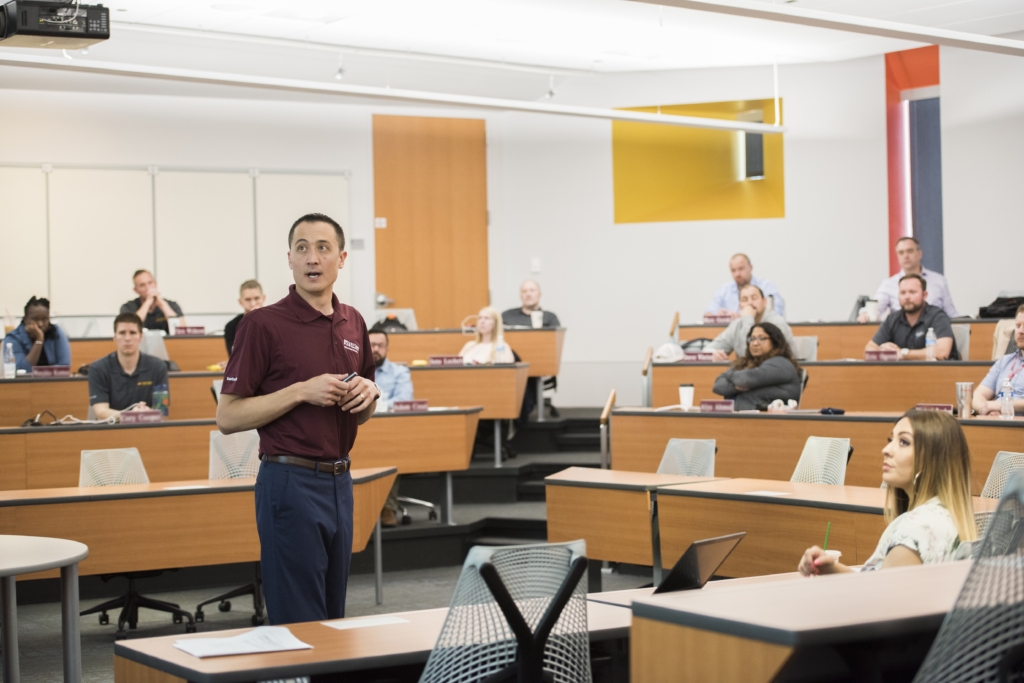
'We offer a very rigorous curriculum taught by world renowned faculty. I believe that the source of our success is the prestige associated with a highly ranked program together with the low cost that we offer to the student,' says Luiz Mesquita, associate dean of graduate programs. Courtesy photo
Any other innovations or curriculum tweaks that we should highlight?
There are many, but if I were to cite one I'd say that we are watching very closely this build up of artificial intelligence applied for business. We are always monitoring how this will impact business practice. It will impact how executive education evolves. It will impact how decision making evolves. I think we are at the verge of observing a massive transformation of what is relevant for human beings to learn, the skill set that will impact their careers.
Think about it: Back in the late 60s and early 70s, for example, before calculators became ubiquitous, there were basic math skill sets that you had to kind of memorize and regurgitate. But once calculators became available, the skill set that you had to acquire evolved from that to what to do with that math result.
I believe that we are going to go through another wave of transformation similar to that in which the basic skill set will be the decision making based on all the information that is now at our fingertips. That decision making that you are able to extract and elicit from that data, plus the human interactions that may help you understand where the team wants to go. The leadership skills to bring people to a consensus, those will become even more critical to the success of professionals and the organizations they lead. It is a moment of reckoning for everybody.
Anything else you’d like to add?
If I were looking for an Executive MBA, here are some things that would convince me to choose W. P. Carey School of Business: Definitely, if you're in healthcare, you belong nowhere else. There's no other program that brings the rigor of an executive MBA with our faculty – faculty publishing in the very top journals, who are leaders in what they do, particularly in the areas of supply chain, healthcare, supply chain management, and leadership. There's nowhere else you're going to get better concentrations or content than here.
If you are a busy executive at the verge of becoming the vice president or the president of a division, you are not looking to leave your job. You are looking for flexibility. The advantage of our program is that you spend a whole month having regurgitated that content and applying it. You build a network within your cohort where you can pick up the phone and ask what they think. It’s like having a mini board of people helping make decisions and understand. You can consult with professors as well. That flexibility and access is hard to match.
DON’T MISS THESE STORIES IN OUR EMBA SPOTLIGHT SERIES:





Questions about this article? Email us or leave a comment below.